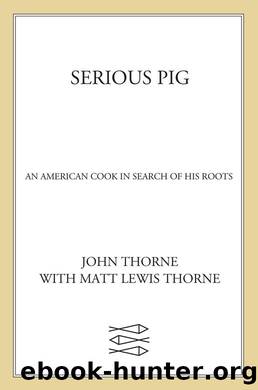Serious Pig: An American Cook in Search of His Roots by John Thorne & Matt Lewis Thorne

Author:John Thorne & Matt Lewis Thorne [Thorne, John]
Language: eng
Format: mobi
Publisher: Farrar, Straus and Giroux
Published: 2000-11-16T00:00:00+00:00
After being roasted and ground, Chiccory is mixed with coffee in various proportions, and thus forms a pleasant beverage; or, if used alone, will be found a tolerable substitute for genuine coffee.
Well, maybe. I suspect that these two passages tell us more about the quality and price of coffee beans at that time than they do about the pleasures of drinking roasted chicory. As a hot beverage it isnât at all unpleasant. The slightly fruity flavor is complexly bitter and sweet, and it is still used (by Celestial Seasonings, for one, in their Morning Thunder blend) to give body, color, and flavor to herbal teas. However, as a coffee substitute it has two strikes against it. It doesnât taste much like coffee and it doesnât contain any caffeine. But these lacks matter less if the coffee you drink doesnât have all that much coffee flavor to begin with ⦠and has more than enough caffeine to spare.
Almost all the worldâs coffee comes from two varieties of coffee plants, Coffea robusta and Coffea arabica. Coffees with a distinct âcoffeeâ taste (whatever their other overtones) come from the arabica variety. But since the robusta variety is hardier, more productive, and easier to grow, it, not arabica, produces most of the worldâs supply of coffee beans ⦠and all of its cheapest ones.
Doesnât all coffee taste like coffee? Yes, it does ⦠but a cup brewed from robusta beans tastes like instant coffeeâthat is, coffee with something missing. Almost all instant coffee is 100 percent robusta, and that as much as the instantizing is why it tastes the way it does. In such a brew, roast chicory not only adds a fruity, acidic tang but also serves the same purpose as the âtoneâ button on a cheap radioâit inserts a false but still satisfying mellifluous depth.
No one in their right mind would add chicory to arabica coffee, but forcedâby problems of supply or personal meansâto drink a robusta brew, one might do worse than to roast the beans black as the devil and throw in a scoop of chicory to round the flavor out. This dilution also helps with digestion, since robusta beans are naturally high in caffeine and more are used when making a dark-roast brew.
However, the most important aspect of dark-roasted, chicory-flavored coffee may be that it allows the impression of a conscious choice. It is the preferred choice of the poor but proud, who can justly claim to like what poverty forces them to choose. Louisiana had its first taste of this method during the Civil War, when the Northern blockade cut off regular coffee shipments. Even so, if one can trust the evidence of later cookbooks and visitors, there was no lingering affection for it. Mark Twain, for example, despite his many visits to New Orleans, seems to have first met up with (and thoroughly detested) coffee with chicory in Germany.
Nor does any mention of it appear in the early Creole cookbooks, including La Cuisine Créole and The Picayuneâs Creole Cook Book, which devotes considerable space to the art of making a good cup of coffee.
Download
This site does not store any files on its server. We only index and link to content provided by other sites. Please contact the content providers to delete copyright contents if any and email us, we'll remove relevant links or contents immediately.
A Court of Wings and Ruin by Sarah J. Maas(7821)
The Death of the Heart by Elizabeth Bowen(3610)
Better Homes and Gardens New Cookbook by Better Homes & Gardens(3588)
The Sprouting Book by Ann Wigmore(3587)
BraveTart by Stella Parks(3443)
Salt, Fat, Acid, Heat: Mastering the Elements of Good Cooking by Nosrat Samin(3142)
Sauces by James Peterson(3089)
Kitchen confidential by Anthony Bourdain(3080)
The Bread Bible by Rose Levy Beranbaum(3066)
Classic by Mary Berry(3010)
Solo Food by Janneke Vreugdenhil(2969)
Ottolenghi - The Cookbook by Yotam Ottolenghi(2936)
Martha Stewart's Baking Handbook by Martha Stewart(2854)
Day by Elie Wiesel(2781)
Betty Crocker's Good and Easy Cook Book by Betty Crocker(2719)
The Plant Paradox by Dr. Steven R. Gundry M.D(2611)
My Pantry by Alice Waters(2609)
The Kitchen Counter Cooking School by Kathleen Flinn(2515)
Hot Sauce Nation by Denver Nicks(2489)
